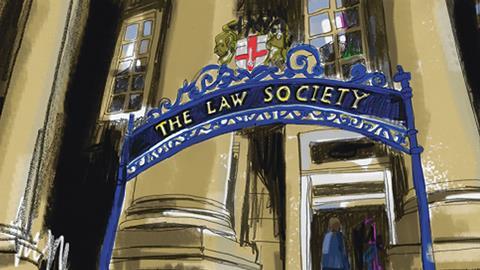2020 has been an extraordinary year for the legal profession, the country, and for the Law Society, writes Paul Tennant
As we launch our business plan for 2020/21, I want to reflect briefly on some of the highlights of the past 12 months, and the lessons we will be taking into our future operations.

Looking back
Having joined the Law Society three years ago, I was proud of what the team had achieved in my tenure so far and looking forward to pressing ahead with transforming the organisation in 2020. Little did I, or anybody else, know what was around the corner.
In most years, the fire at our Chancery Lane office in early February would be the most critical interruption an organisation would have to come to terms with.
We had to react swiftly and, importantly, we had already invested in modernising our IT and systems over the past few years. So when that crisis hit, we could all work from home immediately and continue to deliver for our members, despite the challenging circumstances, without losing a day of operations.
The impact of the fire on us as an organisation then paled into insignificance as the Covid-19 pandemic, and resulting lockdown, took centre stage in March.
Fortunately, being ‘remote-ready’, as we had been before the Chancery Lane blaze, and the experience gained from working remotely after the fire, left us better prepared than many others may have been to continue operating successfully, and help our members come to terms with the extraordinary new environment.
It was clear from the outset that we needed to engage directly with members and to listen to their concerns and the issues they were facing, so that we could provide them with relevant support and assistance. We were quickly able to provide valuable advice, support and guidance, and spoke visibly on behalf of members, securing important policy changes.
This has been the bedrock of our approach and allowed us to adapt to member needs as the impact of the pandemic shifted and it became clear it was here to stay.
Picking out just a few examples, we helped ensure our members could continue to keep the wheels of justice turning and were safe when doing so, by influencing protocols in court, police stations and prisons.
The government accepted our definition of which lawyers should count as key workers, allowing solicitors’ children to attend school and members to continue working, and we successfully pressed the SRA to take a proportionate approach to enforcement.
Changes were secured to ensure members could get on with business while working remotely and safely, while targeted support was delivered to those under the most financial pressure through heavy discounts on accreditations and making most events free.
At the same time, we were able to complete core work on behalf of the profession. This included supporting members to continue practising in the EU after Brexit, securing changes in both criminal and civil legal aid that mean more people will get access to justice, and defending the rule of law.
Our policy and lobbying resulted in the SRA abandoning its proposed reforms of professional indemnity insurance, which could have weakened the protections that solicitors and consumers received.
Internally, we have continued our transformation programme – which was key to us being agile and responsive when crisis hit – looking to improve our offering to members. This included launching a new customer relationship management system, a new website and a new online learning platform for our members.
I am extremely grateful to our staff and voluntary members for what they achieved during an unprecedented year, and I hope this has been of help to you and your firms.
Looking ahead
Working against a backdrop of disruption and uncertainty created by the pandemic, as well as the ongoing fallout from Brexit, focused our thinking more sharply than ever on what the real priorities are for the profession and the Society in the coming year.
If 2020 has taught us anything, it is to expect the unexpected. We know that the year ahead will bring more uncertainty for the country, the economy, the profession and the Law Society, as demonstrated by us all now entering a second national lockdown. The financial, political, regulatory and policy landscape will be increasingly challenging.
In preparing our 2020/21 plans we are seeking to manage that uncertainty, particularly in the wider world, on behalf of our members.
At the forefront of our work will be promoting a number of key themes on behalf of our members, who have told us what matters most to them, as well as improving what we offer to members and modernising our commercial strategy.
We will promote access to justice by working to ensure that vital Ministry of Justice reviews into the sustainability of legal aid practice, the means test, and the role of information, advice and representation, deliver clear benefits for our members and their clients. Alongside this, we want to ensure the courts continue to function during the pandemic, emerging from the other side modernised but without compromising justice outcomes.
The Law Society will also take its place at the forefront of efforts to protect and uphold the rule of law from potential threats, both domestic and international. We aim to ensure that government plans to reform judicial review and the human rights framework do not have a detrimental effect on access to justice. Particularly concerning is the recent spate of political and media attacks on the rule of law. Promoting and defending the rule of law will be a key part of what the Society stands for over the next 12 months, as it is a core value underlying both our justice system and our economy.
In the year that the EU transition period ends, the Law Society will ensure that our international firms and members have the information they need to adapt their businesses. We will continue to seek liberalisation of key markets in the EU and globally, through dialogue with overseas bars and the opportunities that an independent UK trade policy regime creates. A key priority will be pressing for a rapid accession to the Lugano Convention, to ensure the best possible regime for recognition and enforcement of judgments. We will also work with members, the government and judiciary to preserve and strengthen the qualities that continue to make England and Wales uniquely attractive as a Global Legal centre.
Elsewhere, we will influence regulation and money laundering rules and support the profession in compliance. This will include seeking to ensure members’ risk and compliance needs, especially in relation to anti-money laundering, are fully understood and they have the right support products in place. We will influence the Legal Services Board’s planned review of reserved activities, the outcome of the Competition and Markets Authority’s review and the government’s economic crime levy to ensure that our policy positions are well reflected in the final outcomes.
Recognising the challenges that both we and many others face to create a modern, diverse and inclusive profession, we will challenge and support members to adopt practices and recommendations from recent projects on gender, race and disability.
The last year has illustrated more than ever the need to support the economic value and viability of members’ businesses. Members should feel that the Law Society ‘has their back’ and that their businesses are supported during a turbulent economic period, with the Society seen as a strong advocate of the profession and its importance to the economic recovery.
In our member survey this year, we heard that you wanted us to strengthen what we offer to members and to improve our communications with you. We will review what we offer to make sure our products and services meet the needs of members, as well as making sure we are member-focused in everything that we do. This includes increasing our digital engagement with members through online events, which has proved successful during the pandemic and which we will build on. For example, we have just launched a digital community pilot for small firms, where they can talk to us about what matters most to them.
Our website, and learning and education services will also continue to be transformed to make it easier to find and use our services, with no more clunky old technology. We will be much clearer to members about what services they receive for free and encourage members to use them, whatever their business, wherever they are based and whatever stage of their career they are at.
We recognise that members are facing a range of new challenges, including redundancy, and will tailor the support we offer accordingly.
Given the economic challenges which we all face, we need to modernise our commercial strategy. This can be achieved by bringing on board new commercial partners, modernising the way we advertise on our digital channels, offering new courses on Law Society Learning to support the expansion of accreditations, and making the most of income from events moving to an online or hybrid model.
Plans are important to demonstrate we are listening and responding to you and, as with this year, I suspect we will need to change and adapt as the operating environment changes. We will continue to focus on making a difference for solicitors, being the voice of the profession with decision-makers, and campaigning and lobbying to protect access to justice and the rule of law.
No doubt this will be a difficult year ahead for our members. Our role is to rise to the challenge and be there for them, whatever circumstances they face.
Paul Tennant is chief executive of the Law Society
































No comments yet